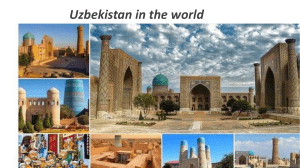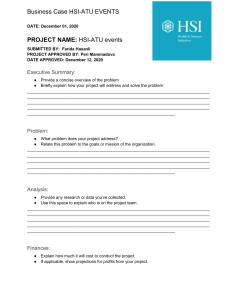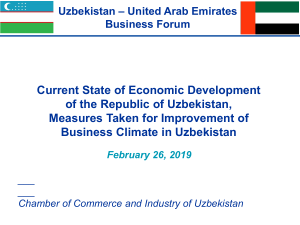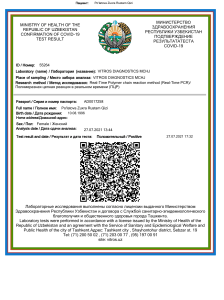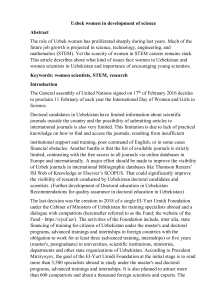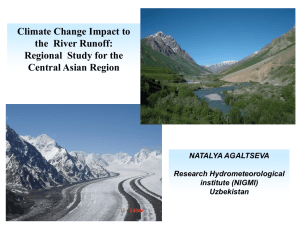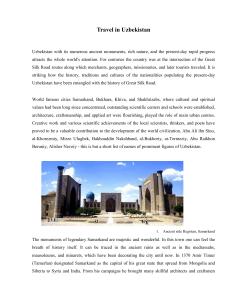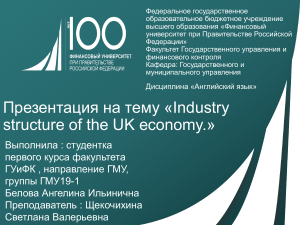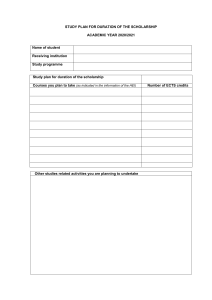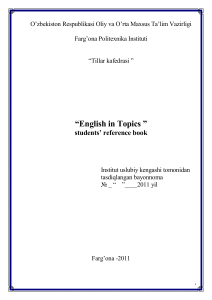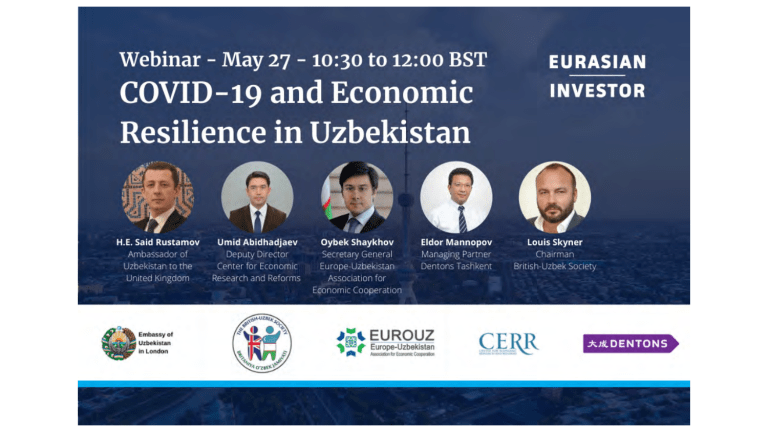
IMPACTS OF CORONAVIRUS AND RESPONSES TO PRESERVE ECONOMIC SUSTAINABILITY IN UZBEKISTAN Tashkent, 2020 3333 14 2636 total cases +72 dead +1 cured +29 40% 60% 1165 total cases 4 9 11 18 23 33 cured 41 45 46 50 60 75 266 172 181 205 227 88 104 144 150 7 7 8 13 25 25 25 342 457 30 520 546 582 30 30 30 38 669 42 767 42 865 66 1302 1349 1405 1490 1564 1804 1716 1758 1627 1678 2233 2149 2189 2207 2086 2118 2002 2039 1939 1862 1869 1904 998 85 99 107 129 156 194 225 261 357 450 561 621 707 789 892 992 1096 1133 1212 1271 1319 1405 1501 1577 2298 2325 2349 1656 1775 2418 1846 1881 2486 2547 2753 2791 2686 2738 2612 2645 2075 1988 2039 2135 2157 2212 2246 2855 2939 2967 2372 2407 2313 2338 3036 3215 3115 3164 3290 3333 2636 2636 2565 2607 2492 2532 3.15 3.16 3.17 3.18 3.19 3.20 3.21 3.22 3.23 3.24 3.25 3.26 3.27 3.28 3.29 3.30 3.31 4.1 4.2 4.3 4.4 4.5 4.6 4.7 4.8 4.9 4.10 4.11 4.12 4.13 4.14 4.15 4.16 4.17 4.18 4.19 4.20 4.21 4.22 4.23 4.24 4.25 4.26 4.27 4.28 4.29 4.30 5.1 5.2 5.3 5.4 5.5 5.6 5.7 5.8 5.9 5.10 5.11 5.12 5.13 5.14 5.15 5.16 5.17 5.18 5.19 5.20 5.21 5.22 5.23 5.24 5.25 5.26 5.27 INFECTED PATIENTS 4 9 11 310 200 239 102 135 141 162 166 178 87 75 60 50 46 45 41 33 23 18 513 541 425 488 624 721 795 909 1062 1191 1216 1245 1292 1334 1361 1315 1259 1190 1176 1147 1072 1004 939 897 897 865 838 820 774 696 646 632 641 683 540 493 527 488 498 527 499 518 515 496 466 504 554 547 531 570 586 595 May May April 90 Companies restarted Moderately positive Surveyed 6000+ people (representative by gender, age, income, location) Negative answers were more then positive ones • 10% experienced income growth against 46% • 20% see job increase, 46% see job decrease • 15% are willing to buy durables • 88% perceive positively the government measures to support citizens during COVID CONSUMER SENTIMENT INDEX • • • 91 % of companies in industry, 76 % in construction, 52% in services and 44% in trade resumed their activities. 13% increase in amount of loans given by commercial banks compared to April sale of construction materials increased 20% Surveyed 451 companies (representative by sectors and regions) Positive answers were more than negative ones • 34% answered positively • 19% answered negatively BUSINESS ACTIVITY BUSINESS CLIMATE INDEX Measures to mitigate the coronavirus impacts in Uzbekistan World Zero rates of customs duty and excise tax for the importation of 20 categories goods (13 food and 7 hygienic) Tax rates for the use of water resources for the volumes used for irrigation of agricultural land is reduced by 50 percent of the established rates Exports of goods and service s Technology imports Parts Raw materials Specialists Donor aid, state orders exports of gold, uranium, cotton, etc. Government Labor Capital Imports of consumer The accrual and payment of goods tourist (hotel) tax is and suspended services remittanc providing liquidity in the es money market for a total amount of up to 1 trillion soums (100 million USD) per month Goods and services, salary Business Compensation for covering interest expenses: on investment loans issued to business entities in national currency with interest rate not exceeding 1.75 times the size of the main Central Bank rates (15%) in the first year of the loan agreement A guarantee on loans issued to business entities with a positive credit history for working capital replenishment up to 75% inclusive of the loan amount, but not more than 1 million USD, regardless of the number of projects; Payers of VAT, the turnover of which does not exceed 100 000 thousand USD per month and using electronic invoices, is entitled pay VAT on a quarterly basis “Charity and Support” nationwide movement Population Profit, labor Financial Sector Majority of service orientated business entities are exempted from paying land tax and property tax; pay social tax at a reduced rate of 1 percent The Anti-Crisis Fund will allocate additional 20 million USD for the Public Works Fund to use for employment and construction of additional infrastructure in communities. Extension of state financing up to 500 billion soums, for guarantees to businesses and compensation for covering interest expenses on loans. Source: Based on Baldwin (2020b) THANK YOU Umid Abidhadjaev, Ph.D. Deputy Director Center for Economic Research and Reforms Tashkent, Uzbekistan [email protected] We are working on bridging the gap 4.1% GDP growth in the first quarter od 2020 (vs 5.7% in Q1-2019). The Q1 data only partially reflects economic impact : ❑ Gradual quarantine as of March 15 ❑ Q1 trade impact felt with key trade partner China + fiscal pressure over response to COVID-19. The data for the first 4 months published by CB is significantly more reflective: ❑ Export decreased by 10.6% to $4.4 billion, import decreased by 10.8% to $6.4 billion (YoY) ❑ Foreign reserves reached $31.27 billion (+$0.98 in April), but physical gold decreased by 0.1 million ounces ❑ Gold stands at 35.3% of total exports in Jan-Apr 2020, equal to $1.5 billion (26.5% increase YoY) ❑ Compensated significantly for a sharp decrease in exports of : • Natural gas by 51.1% (YoY) • Export of food products by 24.1% (YoY) • Textile fibre by 53.8% (YoY) • Non-ferrous metals 27.8% (YoY) as well cast iron & steel 48.9% (YoY) Expected regional growth rates in GDP Projections for annual GDP growth rate 2020-21 Country 5.8 ADB 4.7 6.5 WORLD BANK 1.6 7 IMF 1.8 Fact EBRD* IMF WB ADB 2019 2020 2020 2020 2020 Uzbekistan 5.6 1.5 1.8 1.6 4.7 Kazakhstan Kyrgyz Republic Tajikistan Turkmenistan CENTRAL ASIA* 4.5 4.5 7.5 6.3 5.1 -3.0 -4.0 -1.0 1.0 -1.2 -2.5 -4.0 1.0 1.8 -1.0 -0.8 0.4 1.0 ** 0.1 1.8 4.0 5.5 6.0 2.8 6.5 ERRD 1.5 0 UZB CENTRAL BANK Notes: 1.5 0 1 2 3 2021 4 2020 5 6 7 8 * Central Asian regional data for EBRD also includes Mongolia ** World Bank has not released updated projections for Turkmenistan’s GDP growth. A full updated economic outlook is expected to be released in early June ❑ Addressing the external shock and the domestic impact of COVID-19 is expected to require additional external financing of $ 4 billion (7% of GDP) according to the latest IMF report. ❑ Fiscal deficit is forecast expected to increase from 0.4 in 2019 to 4.1 percent of GDP in 2020. In addition to automatic stabilizers, the larger deficit reflects tax relief to SME’s & large additional spending needs. ❑ A Presidential decree published on 22-04-2020 (PP-4691) indicates that Uzbekistan has reached preliminary agreements with IFI’s to attract preferential long-term loans and grants in excess of $ 3 billion. ❑ Governments often fund fiscal deficits by issuing bonds. No specific plans announced, but given the data, rapid recovery of markets & Uzbekistan’s rating and stability, it may be reasonable consideration. THANK YOU www.EUROUZ.com [email protected] Oybek Shaykhov Secretary-General Europe-Uzbekistan Association for Economic Cooperation Brussels, Belgium Twitter: @OShaykhov COVID-19: Impact on Business in Uzbekistan Eldor Mannopov Uzbekistan Managing Partner Dentons Tashkent Impact of COVID-19 on investment projects Major challenges faced by investment projects: Labor mobility Liquidity capital flow restrictions Stand-by in projects Supply chain disruptions Travel restrictions Internal & External. Impact of COVID-19 on employment An employer during quarantine is obliged to: vtransfer employees to remote work with full wages (if the workload remains the same). vtransfer an employee to another position, part-time job or place on a paid leave if the work cannot be performed remotely. vpay temporary disability benefit. Mitigation of COVID-19 impact on business Force Majeure Government support Force majeure Between 15 March 15 to 20 May, over 20 regulations adopted, which aimed at mitigation of the pandemic impact Fiscal measures Non-fiscal measures • • Accelerated customs clearance procedure; • Tax audit is deferred until 1 January, 2021; • Deferral of principal payment for loan debts until 1 October for businesses faced challenges due to imposition of foreign trade restrictions; • • Decrease of taxes rates by 50% for water used for irrigation of agricultural land; Small businesses (catering, cinemas) exempted from land and property taxes for 1 June – 1 September; 0 excise taxes and customs duties rates until 31 December for medical equipment and consumer goods. • Allocating interest-free budget loans to repay loans for strategic enterprises. • On the 25 March, the Government of Uzbekistan established force majeure regime due to COVID-19 pandemic; • Only extraordinary, unavoidable and unforeseen circumstances, caused by natural phenomena or socio-economic circumstances, which do not depend on the will and actions of the parties is considered to be force majeure; • The MIFT and CCI issue certificates confirming occurrence of force majeure with respect to foreign trade; • The certificate is issued for 1 day. Thank you! Q&A Eldor Mannopov Uzbekistan Managing Partner Dentons Tashkent T +998 78 150 31 05 E [email protected] 5 The economic impact of COVID 19 on Uzbekistan: in a global context British Uzbek Society May 2020 Louis Skyner, Partner, London / Tashkent The global economic impact of COVID 19 • COVID has triggered a significant economic crisis as it has catalysed a self – enforcing cycle: • a supply shock – plant shutdowns and logistics bottlenecks are reducing the supply of goods with businesses reducing investment; • a demand shock – quarantine measures are curtailing consumer spending and have caused a decline in consumer confidence; and, • a credit crunch – the reduction in business and consumer lending with liquidity restraints has further reduced investment and consumption. • In addition, COVID has: • had a negative impact on capital markets inflicting a reduction of investment capital and consumable wealth; and, • has led to a widening of credit spreads negatively impacting on lending. 2 The economic impact of COVID 19 on Uzbekistan • Uzbekistan is faring better than its neighbours and other emerging economies as it has a diversified economy in terms of export and supplies a number of key markets. • Further, as its economy is not sophisticated, there being no long-term impact on demand for agricultural produce and commodities, the process of recovery should be simpler than in developed economies. • All the IFIs predict a GDP growth rebound and level much quicker and higher than the majority of emerging and frontier economies. • Although the government has increased the external debt ceiling to 50% of GDP the IFIs do not view Uzbekistan as being at risk as the level of non – IFI debt remains modest. 3 Key impacts that concern investors • The April remittances of USD 250 million represented a 50% fall year on year and a decrease of 15% from March. • The Central Bank predicts that remittances will fall by 50% in Q2 year on year, with the total decline for 2020 of around 35% or 5% of GDP. • The 15% devaluation in the national currencies of Uzbekistan’s main trading partners, lower prices for commodities, a fall in export earnings, and a reduction in revenue from remittances precipitated a devaluation of the Uzbek Soum of 5.7% in April. • Border closures, lower commodity prices and the reduced economic activity of key trading partners has led to a fall in foreign trade turnover. • The current account deficit is set to increase from 6.5% to 9.4% of GDP in 2020, a deficit which the government plans to finance through external debt and drawing on the country’s foreign currency reserves. 4 Threat to FDI and portfolio investment • FDI could decline as the share value of strategic investors are hit and CAPEX reduced. • Banks are likely to be less willing to finance high risk projects, i.e. projects for which project revenues have been reduced and which have higher credit risk. • Portfolio investors / funds could refocus on developed markets due to the drop in share prices on established exchanges and the opportunity that presents. 5 Contact Louis Skyner Partner M: +44 7815 005 813 [email protected] Louis, an English qualified solicitor, joined Dentons in May 2017 having worked in the project finance and energy practice of a leading international law firm in both its London and Moscow offices. He is a partner in the firm’s London and Tashkent offices. His oil & gas practice has primarily been based on advising E&P companies on their participation in upstream and downstream projects, project sponsors on the negotiation of finance and project documents, and project operators on a variety of contractual and regulatory issues in Russia, Kazakhstan and Uzbekistan. In terms of his power practice Louis has advised the project sponsors of a variety of solar, wind and hydro projects on their structuring and financing, and the operators on the negotiation of the key project documents, e.g. EPC contracts and offtake arrangements, in Russia, Ukraine, and Uzbekistan Louis has used the aforementioned experience to provide advice to development banks and governments across the region: on the implementation of concession and public private partnership arrangements for energy and infrastructure projects in Russia and Ukraine; and, the unbundling and the development of competitive power markets in Uzbekistan. Finally, over the past three years Louis has been advising a number of funds on their investments in Uzbekistan, and the Uzbek government on the structuring of mechanisms facilitating foreign investment. This work includes advising: private equity funds on their acquisition of publicly listed and unlisted securities; and, the Uzbek government on the structuring of a State – owned direct investment fund established to facilitate, structure, and co-finance investment projects. Aside from his legal practice Louis has authored numerous articles on Eurasian energy market regulation, economics and politics, from 2005 to 2011 as an associate fellow at Chatham House in London, from 2012 to 2014 as adjunct professor of the New Economic School in Moscow, from 2015 to 2016 as associate professor of the European University in St Petersburg, and from 2016 as an associate fellow of the Forum for Central Asian Studies at the University of Cambridge. Finally, Louis was elected chairman of the British Uzbek Society in October 2018. 6
